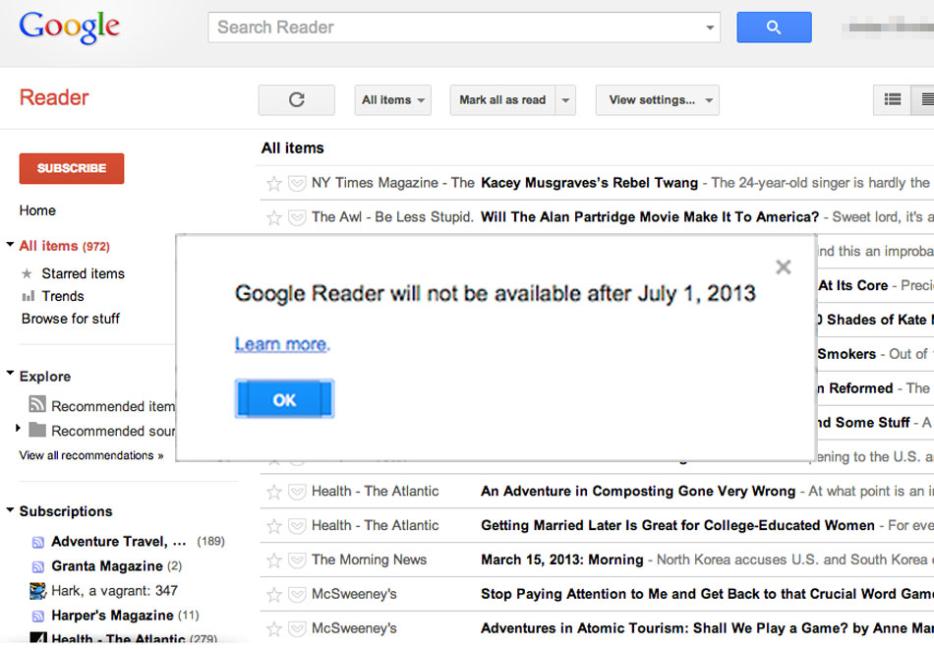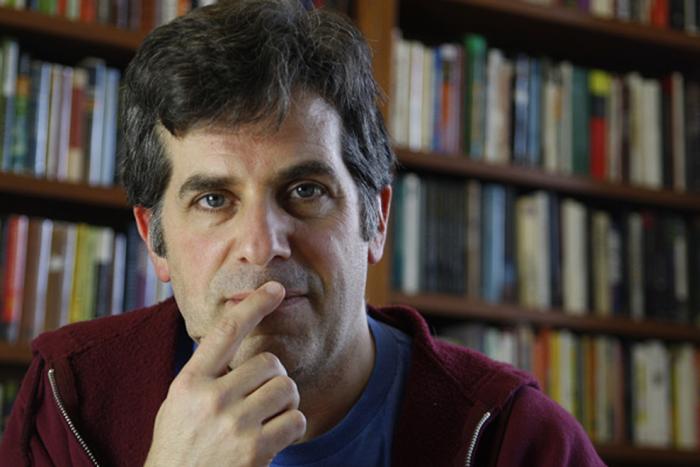Google Reader was a map; the mass of online information was the territory. It was a way of making sense of that which, by rights, should deny any attempts at organization. That’s the best way I can explain what, to the outsider, must have seemed a baffling explosion of outrage Wednesday night when Google announced it was shutting Reader down.
The service in question is an RSS reader. Almost every website (including this one) has something called an RSS feed which is like on ongoing ticker of new published pieces. An RSS reader lets you take those feeds—whether from the ten sites you read regularly, or the 400 you try to keep up with—and aggregate them all in one place.
So what’s the big deal? It’s true that the demise of Reader is due in part to the shift toward using “social filtering” like Twitter and Facebook to gather news and entertainment. You are far more likely now to simply follow news sites on social media and get your information there. But rather than the interjections of friends, acquaintances and brands whose interests, inevitably, could never overlap perfectly with yours, Google Reader is one of the few ways you can "curate" a list of things to read tailored to your specific tastes. (There is also, of course, the much more important issue that Reader was a way for people under governments like Iran’s to continue to read sites otherwise blocked by the state. This is always the problem with online services: People put them to inventive, unintended uses, and when they are shut down, those nobly subversive aims are thwarted.)
What I’m perhaps most struck by though is how genuinely sad people were at the news. Perhaps it’s because how we approach information shapes it. Google Reader was an interpretive lens, a precise and tiny cartography for an impossibly vast land—maybe it was exactly those six tech blogs, two crocheting communities and seven philosophy sites that, together, best framed how you understand the world. I’m stretching the truth here, but an RSS reader is a certainly a fundamentally different way of getting information than Twitter because, at least compared to newer methods, you are more in control. Its shutdown is therefore not just something for information-addicted nerds to lament; it’s a loss of a lens through which to see things on your own terms—or, as Alastair Roberts put it, “without the clamouring reactions of other readers asphyxiating the texts.”
Because Google Reader is a representation of that, it is likely that its absence will only be short-lived, and we’ll see many phantom doubles arise in its image. Maybe more importantly, though, it helps explain the anger and immense frustration people feel at the loss. It’s as if Google has said to a group of very vocal, near-sighted bloggers, “We’re throwing away your glasses, now take your friends’ hands and let them guide you along the path.”
That may be an exaggeration, but I know I’m not alone in experiencing a strangely, almost inappropriately emotional response to the news. I can’t be objective. I also can’t help but think of this: A Tumblr called Goldenfiddle, has for the past few months, been filled with posts with titles like “Eva Longoria—shopping in Auckland, New Zealand (10/3/12).” If, like many others, you had Tumblr feeds in Google Reader, there amidst the ever-expanding list, that title would feel a part of that linear flow of non-linear stuff: One more item in your impossible shopping list of the world’s data. The catch? When you’d click, it’d merely be a garbled picture, a "new aesthetic" digital distortion of the image you were expecting to see.
Placed within that structure of ongoing information, it was a ploy that worked by preying on your desire, and then refusing it. You wanted to see a hot celebrity, but what you got was something else entirely: A thought, a perspective, a tiny momentary jolt into thinking about the world and yourself differently. It was something that surprised you but, like a time capsule in miniature, it was a surprise you had set up for yourself by putting it there in the first place. And maybe that, more than maps and territories, is the best way to explain why we are sad to see the death of this thing that we loved and loathed in equal measure. It was a way of building a perspective that sucked us in because, handpicked to represent the best of the wider world—and, secretly, the best in us—it somehow never failed to be remarkable.






